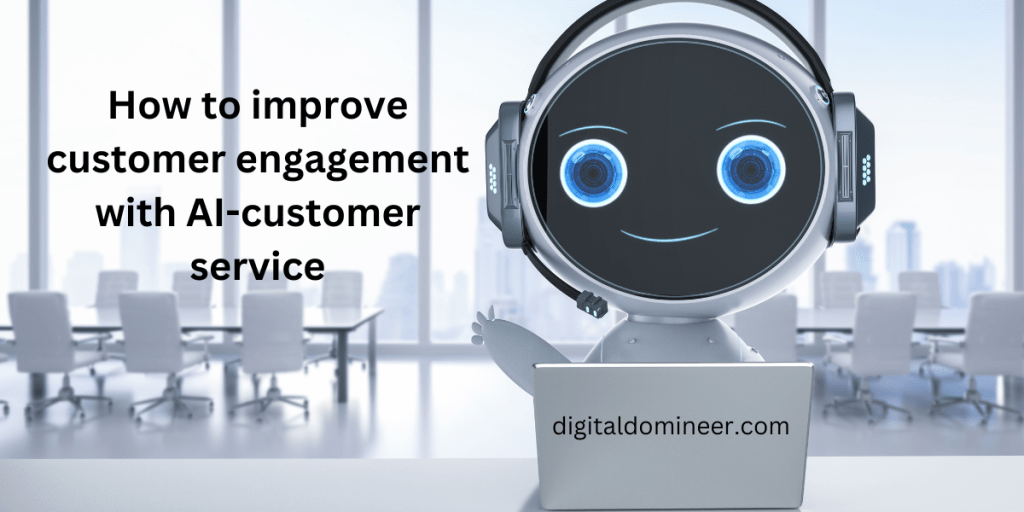1. Introduction
In today’s digital age, customer engagement is more important than ever for businesses to thrive. With the rise of AI technology, customer service is undergoing a transformation that is revolutionizing the way companies interact with their customers. AI customer service and engagement tools are now being used to personalize customer experiences, streamline processes, and provide faster, more efficient support. This guide aims to provide you with everything you need to know about using AI-customer service to improve customer engagement, including the benefits, challenges, and best practices for implementing AI automation. Read on to discover how AI technology can take your customer service to the next level.
2. The significance of customer engagement in today's digital age
In today’s digital age, customer engagement has become a critical factor in the success of any business. With the increasing number of customer touchpoints across various platforms and channels, it is more challenging than ever to capture and maintain customer attention. However, the rewards of effective customer engagement are substantial.
Engaging customers effectively can lead to increased loyalty, higher customer satisfaction, and a better overall customer experience. AI-powered customer service tools can play a significant role in achieving this goal. By leveraging artificial intelligence, businesses can provide personalized experiences and real-time support, which are crucial for building strong customer relationships.
In the next section of this guide, we will delve into the various strategies and techniques you can implement to enhance customer engagement using AI-customer service. From personalized recommendations to conversational chatbots, we will explore how these technologies can revolutionize your customer engagement efforts. Stay tuned to discover how to leverage AI to create meaningful connections with your customers.
3. Understanding the power of AI in customer service
Artificial Intelligence (AI) has revolutionized various industries, including customer service. It has the power to transform the way businesses interact with their customers, providing personalized experiences that were once unimaginable.
AI-powered customer service tools can analyze vast amounts of data to understand customer preferences, behavior, and needs. This enables businesses to deliver highly targeted recommendations and suggestions that resonate with their customers. By understanding each customer on an individual level, businesses can create meaningful connections and foster long-term loyalty.
Additionally, AI can enhance customer service through the use of conversational chatbots. These intelligent bots can engage in natural, human-like conversations, providing immediate assistance and support to customers 24/7. They can answer frequently asked questions, resolve simple issues, and escalate complex queries to human agents seamlessly.
In the following sections, we will explore in-depth how AI can be leveraged to improve customer engagement across various touchpoints. From chatbots to personalized messaging, we will dive into the practical strategies and techniques you can implement to supercharge your customer service efforts. Get ready to unlock the full potential of AI for enhancing customer engagement.

4. Implementing an AI-powered customer service system
Implementing an AI-powered customer service system can seem like a daunting task, but with careful planning and execution, it can revolutionize your customer engagement efforts. Here’s how you can get started:
- Identify your customer service pain points: Before implementing any AI system, it’s crucial to identify the pain points in your current customer service processes. Are customers experiencing long wait times, or are they struggling to find answers to their queries? Understanding these pain points will help you tailor your AI solution to address specific needs.
- Choose the right AI technology: There are a variety of AI technologies available, such as chatbots, virtual assistants, and voice recognition systems. Consider your business requirements and customer preferences when selecting the right AI technology for your customer service.
- Train your AI system: Training your AI system is vital to ensure accurate and personalized customer interactions. Provide your AI with a vast amount of data, including customer inquiries, past interactions, and FAQs. This will help it learn and understand your customers’ needs and tailor responses accordingly.
- Integrate AI with your existing systems: Seamless integration of AI with your existing customer service systems is essential. This allows for a smooth transition and ensures that all customer data is centralized for better analysis and personalized recommendations.
- Monitor and optimize: Continuously monitor your AI-powered customer service system’s performance and gather feedback from customers. Regularly optimize the system to improve accuracy, response time, and customer satisfaction.
By implementing an AI-powered customer service system, you can streamline your customer interactions, enhance personalization, and ultimately improve overall customer engagement. Stay tuned for the next section, where we will discuss how AI can be utilized to personalize customer messaging and drive meaningful connections with your audience.
5. Personalizing customer interactions with AI
In today’s digital age, customers expect personalized experiences. AI-powered customer service systems can help you deliver just that. With AI, you can personalize customer interactions to create a more tailored and engaging customer experience. Here’s how:
- Use customer data: AI can analyze vast amounts of customer data to gain insights into preferences, behavior patterns, and purchase history. By leveraging this data, you can customize interactions based on individual customer needs, making them feel valued and understood.
- Implement chatbots and virtual assistants: AI-powered chatbots and virtual assistants can provide personalized recommendations, answer specific queries, and guide customers through the buying process. These virtual assistants learn from each interaction, getting smarter over time and delivering increasingly accurate recommendations.
- Utilize predictive analytics: AI can analyze customer data to predict future needs and preferences. By knowing what customers are likely to want or need, you can proactively offer personalized suggestions or promotions, increasing the chances of a successful engagement.
- Enable self-service options: AI-powered self-service options, such as smart search capabilities and automated FAQs, allow customers to find the information they need quickly and efficiently. By providing personalized responses and relevant content, you can significantly enhance the customer experience.
Implementing AI to personalize customer interactions can lead to higher customer satisfaction, increased loyalty, and ultimately, a stronger connection between your brand and customers. Stay tuned for the next section, where we will explore how AI can enhance customer engagement through proactive communication and support.
6. Proactive customer service through AI
One of the most significant advantages of AI-powered customer service is its ability to provide proactive support to customers. Gone are the days of waiting for customers to reach out with their concerns or issues – with AI, you can anticipate their needs and offer support before they even ask for it.
AI can analyze customer behaviors, interactions, and purchase history to identify potential issues or areas where assistance may be needed. For example, if a customer repeatedly adds items to their cart but doesn’t complete the purchase, AI can trigger a personalized message offering assistance or a special discount to encourage them to complete the transaction.
Additionally, AI can monitor social media platforms and online reviews to identify any negative sentiment or complaints about your brand. By detecting these issues in real-time, you can quickly reach out to customers, address their concerns, and offer a resolution, further enhancing their experience.
By taking a proactive approach to customer service, you not only demonstrate that you care about your customers’ satisfaction, but you also have the opportunity to resolve issues before they escalate. This not only improves customer engagement but also fosters a positive reputation for your brand.
In the next section, we will delve into how AI can personalize the post-purchase experience, ensuring that customers feel valued and supported even after they have made a purchase.
7. Measuring the success of AI-customer service engagement
As businesses strive to improve customer engagement with AI-powered customer service, it becomes essential to measure the success of these efforts. By tracking key metrics, you can gauge the impact of AI on customer satisfaction and loyalty.
One metric to consider is customer satisfaction scores. Through surveys or feedback forms, you can measure how satisfied customers are with their interactions with AI-powered customer service. Monitoring changes in satisfaction scores over time will allow you to identify any improvements or areas for further optimization.
Another metric to track is response time. AI can significantly reduce response times by automating certain tasks and providing instant resolutions. By measuring the average time it takes for AI to respond to customer queries, you can identify opportunities to further streamline the process and provide even faster support.
Lastly, customer retention rate is a crucial metric to evaluate the effectiveness of AI-powered customer service. By analyzing whether customers continue to engage with your brand after receiving AI support, you can determine if the customer service experience provided by AI is meeting their expectations and fostering lasting relationships.
In conclusion, measuring the success of AI-customer service engagement is crucial to continuously improve and optimize your customer service strategy. By tracking customer satisfaction scores, response time, and customer retention, you can ensure that AI is truly enhancing the customer experience and driving engagement.
8. Best practices for using AI to enhance customer engagement
As businesses navigate the world of AI-powered customer service, it’s important to understand the best practices for using this technology to enhance customer engagement. By following these guidelines, you can maximize the benefits of AI and create a seamless and personalized customer experience.
- Training and implementation: Invest time and resources in properly training your AI system. Ensure that it understands your brand values, products, and services, so it can provide accurate and relevant information to customers.
- Natural language processing: Utilize advanced natural language processing capabilities to enable AI to understand and respond to customer queries in a conversational manner. This will enhance the customer experience by providing more human-like interactions.
- Personalization: Leverage AI’s ability to gather and analyze customer data to deliver personalized recommendations and tailored experiences. This can increase customer satisfaction and drive deeper engagement.
- Seamless integration: Integrate AI seamlessly into your existing customer service channels to provide a consistent and smooth experience across different touchpoints. This will avoid any disruptions in the customer journey.
- Continuous improvement: Regularly analyze the performance of your AI system and make necessary refinements based on customer feedback and emerging trends. This will ensure that your AI technology is always up-to-date and meeting customer expectations.
By following these best practices, you can harness the power of AI to engage your customers in new and exciting ways. Stay tuned for our next blog section where we will explore real-life examples of businesses successfully incorporating AI into their customer engagement strategy.

9. Conclusion: The future of customer engagement with AI
In conclusion, the future of customer engagement with AI is promising. By implementing the best practices discussed in this guide, businesses can elevate their customer service to new heights. The training and implementation of AI systems, coupled with advanced natural language processing, enable more human-like interactions and personalized experiences. Seamless integration ensures a consistent customer journey, while continuous improvement based on feedback and trends keeps the AI technology up-to-date and meeting customer expectations.
Looking ahead, businesses that embrace AI-powered customer service will gain a competitive edge in the market. As we move forward, the next blog section will dive into real-life examples of businesses that have successfully incorporated AI into their customer engagement strategy. Stay tuned for inspiration on how to leverage AI and enhance your own customer experience.







